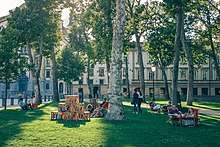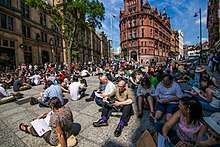City of Literature

UNESCO's City of Literature programme is part of a wider Creative Cities Network which was launched in 2004 and is currently made up of 180 UNESCO Creative Cities globally. Members are drawn from 72 countries and cover seven creative fields: Crafts & Folk Art, Design, Film, Gastronomy, Literature, Music, and Media Arts.[1] The Network was born out of UNESCO's Global Alliance for Cultural Diversity initiative which was created in 2002. The Creative City Network’s aim is to "promote the social, economic and cultural development of cities in both the developed and the developing world." The cities in the network promote their local creative scene and conform to UNESCO’s goal of fostering cultural diversity. They recognise past, present and future: a strong cultural heritage, a vibrant and diverse contemporary cultural scene, and aspirations to extend culture to the next generation at home and to other cities in a global partnership.[1] As of 2017, 28 cities have been designated as part of the City of Literature programme.[2]
The UNESCO Cities of Literature network of 28 cities[3] represents 6 continents and 23 countries, and a combined population of over 26 million.
Criteria for Cities of Literature
To be approved as a City of Literature, cities need to meet a number of criteria set by UNESCO.[4] Designated UNESCO Cities of Literature share similar characteristics:
- Quality, quantity and diversity of publishing in the city
- Quality and quantity of educational programmes focusing on domestic or foreign literature at primary, secondary and tertiary levels
- Literature, drama and/or poetry playing an important role in the city
- Hosting literary events and festivals which promote domestic and foreign literature;
- Existence of libraries, bookstores and public or private cultural centres which preserve, promote and disseminate domestic and foreign literature
- Involvement by the publishing sector in translating literary works from diverse national languages and foreign literature
- Active involvement of traditional and new media in promoting literature and strengthening the market for literary products.
Cities submit bids to UNESCO to be designated a City of Literature. The designations are monitored and reviewed every four years by UNESCO.
Cities of Literature

- Melbourne, Victoria, Australia (2008)
- Iowa City, Iowa, United States (2008)
- Dublin, Ireland (2010)
- Reykjavík, Iceland (2011)[5]
- Norwich, England (2012)
- Kraków, Poland (2013)
- Heidelberg, Germany (2014)
- Dunedin, New Zealand (2014) [6]
- Granada, Spain (2014)
- Prague, Czech Republic (2014)
- Baghdad, Iraq (2015)
- Barcelona, Spain (2015)
- Ljubljana, Slovenia (2015)
- Lviv, Ukraine (2015)
- Montevideo, Uruguay (2015)
- Nottingham, England (2015)

- Óbidos, Portugal (2015)
- Tartu, Estonia (2015)
- Ulyanovsk, Russia (2015)
- Bucheon, South Korea (2017)[7]
- Durban, South Africa (2017)[7]
- Lillehammer, Norway (2017)[7]
- Manchester, England (2017)[7]
- Milan, Italy (2017)[7]
- Québec City, Canada (2017)[7]
- Seattle, United States (2017)[7]
- Utrecht, Netherlands (2017)[7]
References
- 1 2 UNESCO What is the Creative Cities Network?
- ↑ Macdonald, Moira (31 October 2017). "UNESCO declares Seattle a City of Literature". The Seattle Times. Retrieved 1 November 2017.
- ↑ How It Began
- ↑ Do you have what it takes to be a City of Literature?
- ↑ Reykjavík designated as UNESCO Creative City
- ↑ Goodwin, Eileen (2 Dec 2014). "City of Literature writes new chapter". ODT. Retrieved 2 December 2014.
- 1 2 3 4 5 6 7 8 "64 cities join the UNESCO Creative Cities Network" (Press release). UNESCO. 31 October 2017. Retrieved 1 November 2017.
External links
- Creative Cities Map, UNESCO.
- Edinburgh City of Literature Website.
- Melbourne City of Literature Website.
- Iowa City City of Literature Website.
- Dublin City of Literature Website.
- Reykjavík City of Literature Website.
- Writers' Centre Norwich.
- Kraków City of Literature Website.
- Heidelberg City of Literature.
- Dunedin City of Literature Website.
- Granada City of Literature Website.
- Prague City of Literature Website.
- Barcelona City of Literature Website.
- Ljubljana City of Literature.
- Lviv City of Literature Website.
- Nottingham City of Literature Website.
- Óbidos Vila Literária.
- Tartu City of Literature Website.
- Ulyanovsk City of Literature Website.
- UEA Creative Writing.